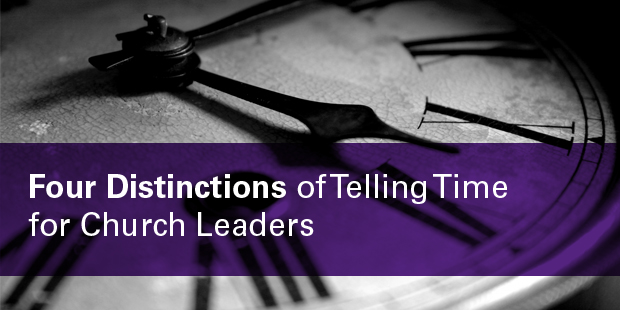
4 Distinctions of Telling Time for Church Leaders
If influencing others is a key component of leadership, then Christian leadership will be about influencing people spiritually, leading them in a direction that helps them become more like Christ.
I’ve always liked Henry and Richard Blackaby’s definition of spiritual leadership:
“The spiritual leader’s task is to move people from where they are to where God wants them to be.”
Most leadership books focus more on principles than people, and this is one reason so many of these books seem out-of-date so quickly.
To think of leadership in terms of timeless principles is easy, but we do well to remember that the tasks of exercising leadership and exerting influence do not take place in a vacuum. They are by nature contextual; that is, they require the use of wisdom in applying principles to various and often-changing contexts.
In this sense, then, Christian leadership is never timeless. Instead, it is a timely application of God-given wisdom regarding specific decisions that must be made in particular moments in time.
Over the next few weeks, I want to return to this topic of Christian leadership. My particular focus is on an essential but sometimes neglected component of Christian leadership: the ability to know “what time it is,” in order to have a clear understanding of the times. There are four spheres in which Christian leaders should know “the time,” and I look forward to fleshing these out in subsequent posts.
1. Biblically
The Christian leader will stand apart from conceptions of leadership that are worldly. How? By the way he or she inhabits the world of the Bible.
Since Christians are called to live within the framework of a biblical worldview that takes one from creation to new creation, Christian leaders must influence others from within this grand narrative.
The Old Testament offers us several examples of leaders who “understood the times” in which they lived and knew “what time it was” biblically. The New Testament adds the element of living in the “time between the times,” in the already / not yet of God’s kingdom. Knowing where we are in the grand sweep of history, according to Scripture, impacts our ethical decisions.
2. Personally
While it is of the utmost importance for a leader to understand biblical teaching on history and the future, one must not lose sight of how important it is to understand one’s own personal story within that overarching narrative.
The Christian leader must be a student not only of world history from a biblical perspective, but also of his or her personal journey. In this way, the leader is best equipped to make good decisions about how to serve God in a particular time, utilizing specific gifts.
Knowing “what time it is” personally is essential for making wise decisions, and these decisions require a deep understanding of one’s personal life circumstances, personal gifting, and personal calling.
3. Organizationally
Once we know ”what time it is” from a biblical and personal standpoint, we must consider the organization and the people we are leading.
Understanding the life and times of an organization is essential for wise decisions; it involves understanding the current state of the organization, how best to communicate the present challenges to others, and envisioning and promoting the future.
Until we understand the particular moment one’s organization is in, whether it be a church or other ministry, we will not know what to do.
4. Culturally
A fourth element of Christian leadership concerns understanding the current context in which one lives. It means one knows “what time it is” culturally and how one’s culture has arrived at its current moment.
The impetus for understanding one’s cultural moment arises from the Great Commission itself, which has an eschatological dimension that must not be ignored. After all, the Great Commission involves making the announcement of King Jesus and leading disciples to obey everything he has commanded. Only within the grand narrative of Scripture does this command make sense, and only in a current cultural context can this command be obeyed.
Not only does the Great Commission challenge cultural views of world history that do not align with a biblical worldview, the Gospel itself is historical to the core, a record of historical events that impinge upon one’s current cultural setting. A biblically formed view of the world, often described as a “biblical worldview,” is vital to fulfilling the Great Commission.
>> Conclusion
- Knowing the time biblically places believers within the overarching story of their world as described by Scripture.
- Knowing the time personally helps individuals to view their strengths and weaknesses and, in answer to God’s call, maximize their potential by matching their gifts to the needs of God’s people.
- Knowing the time organizationally involves a realistic diagnosis of where an organization is and how it got there, as well as healthy communication of the leader’s vision for the future.
- Knowing the time culturally is essential for effective contextualization and the ability to discern the positives and negatives of a particular cultural moment in time.
The Christian leader who knows what time it is in all four of these spheres will be better positioned to make a major impact for God’s kingdom.

Tags: 4 spheres of time, Time, Trevin Wax












